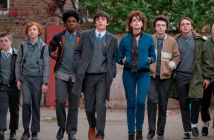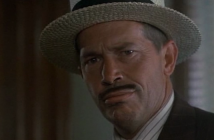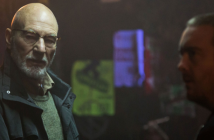
Editor’s Notes: Green Room is currently out in limited theatrical release.
Writer-director Jeremy Saulnier (Blue Ruin) continues his color-and revenge-themed exploration of masculinity, violence, and ideology through his latest film, Green Room, an intense, grim, blackly comic siege-thriller that pits naïve, unwashed twenty-something punk rockers against virulent, vicious “boots and braces” white supremacists led by Patrick Stewart’s menacing, malevolent villain. Stewart turns a film and television career built on playing benevolent, inclusive father figures (i.e., the kinder, gentler side of the patriarchy). As Captain Jean-Luc Picard on Star Trek: The Next Generation and Professor Charles Xavier in the X-Men series, Stewart has projected a calm, cool, intellectual rationalism (“In Stewart We Trust”). It’s to Saulnier’s considerable credit, however, that he recognized that casting against type, casting against expectations and experience, not to mention public personas and onscreen performances, could result in one of the most unsettling, unnerving villains to ever appear in a film.
. . . pits naïve, unwashed twenty-something punk rockers against virulent, vicious “boots and braces” white supremacists led by Patrick Stewart’s menacing, malevolent villain.

When we first meet the Ain’t Rights, Pat (Anton Yelchin, Star Trek), Sam (Alia Shawkat, Arrested Development), Reece (Joe Cole), and Tiger (Callum Turner), they’re waking up to another morning of near destitution, pursuing the punk-rock dream with the kind of “Screw everything, let’s punk rock” attitude that’s already starting to fray. They sleep and live in their van, not because they don’t believe in staying in hotels or motels, but because they can’t afford anything else. They get by on money collected from their gigs and siphoning gas from cars and trucks. A promising gig in Portland, Oregon turns sour when they leave with exactly $6.87 a head. With exactly two options left, quit or go forward into the unknown, they choose the latter, a gig in a backwoods venue owned and operated by white supremacists led by Stewart’s Darcy, a local businessman and top man in the local fascist organization.
Saulnier doesn’t shy away from blood or gore either – simply put, Green Room is an ultra-violent film – but he also doesn’t linger on blood or gore . . .
They open their gig with an anti-Nazi cover of a Dead Kennedys song typical of the confrontational, antagonistic attitude of punk that predates the band by several decades, a sign of the band’s willingness to take risks in pursuit of authenticity and prove themselves worthy of the words “punk” and rock.” For the band, though, they’re performers enacting certain codified, socially predictable or expected roles, placing them in a relative safe zone with an initially hostile audience that comes around to accepting, even embracing their performance. The relative high associated with a good or great performance doesn’t last long. Forgetting his cell phone, Pat wanders back into the green room of the title to witness the aftermath of a seemingly random murder. Almost immediately, the club’s manager, Gabe (Macon Blair), and Darcy’s lieutenants retrieve Pat’s band mates and hold them at gunpoint until Darcy shows up with a plan to resolve the rapidly escalating, tension-filled situation.
Darcy, of course, has a plan, but it doesn’t involve letting the Ain’t Rights leave the nightclub or the compound. In constant fight-or-flight mode, the band try to figure out a plan of their own that doesn’t involve their individual and collective murder. A perceptive, intuitive filmmaker attuned both to genre conventions and genre expectations, Saulnier nimbly plays the “Who’s the actual protagonist?” game with the audience, cycling between Pat, Sam, Reece, and Tiger in brief, sporadic spurts. When Pat goes down, seemingly for the count, it looks like another member of the Ain’t Rights or maybe the only other surviving witness, Amber (Imogen Poots), will take the protagonist title and become the obligatory “Final Girl” or “Final Boy” typical of survival horror. Keeping the question open, keeping the audience guessing highlights Saulnier’s skillful storytelling skills. That the lightly sketched in characters – we learn almost nothing about them except their names, their membership in the Ain’t Rights, and what they do and say – feel fully fleshed out is a testament to Saulnier’s writing and directing, but also a cast that goes a long way toward inhabiting their decidedly non-heroic characters.
Green Room may turn into a John Carpenter-inspired siege thriller (e.g., Assault on Precinct 13), but it’s never less than inspired as the characters talk, argue, talk and argue some more about what to do. Even a character’s early heroism isn’t a guarantee that he or she won’t do something reckless, panicking under the overwhelming, claustrophobic pressure (choosing fight one moment, flight the next). On the surface, it might seem simple – characters revealed by their actions more than what they say or their individual backstories – but in a survival horror/siege thriller like Green Room, it’s nothing short of brilliant. Saulnier even goes as far as humanizing the white supremacists, giving one or two characters a surprisingly level of autonomy and agency. Faced with Darcy, an utterly ruthless sociopath who also happens to be the smartest man in or out of the green room, however, proves to be a daunting, possibly impossible task for the Ain’t Rights and Amber. Saulnier doesn’t shy away from blood or gore either – simply put, Green Room is an ultra-violent film – but he also doesn’t linger on blood or gore, letting a brief glimpse linger in the minds of moviegoers (more like seared in retinas if we’re being accurate).
Writer-director Jeremy Saulnier (Blue Ruin) continues his color-and revenge-themed exploration of masculinity, violence, and ideology through his latest film, Green Room, an intense, grim, blackly comic siege-thriller that pits naïve, unwashed twenty-something punk rockers against virulent, vicious “boots and braces” white supremacists led by Patrick Stewart's menacing, malevolent villain.



